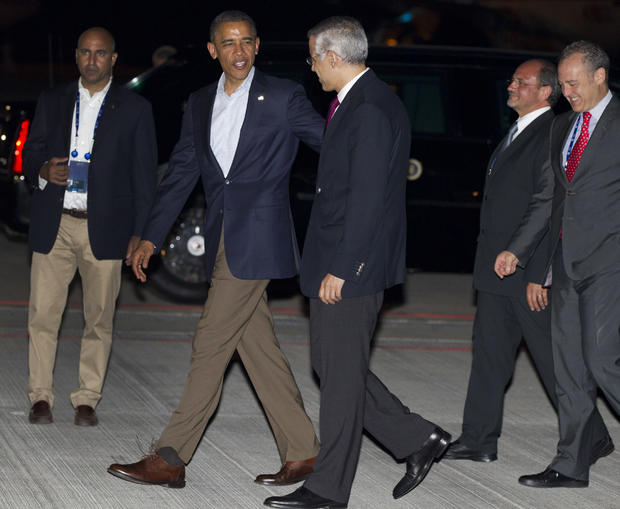Obama arrives at G-20 summit
(CBS News) President Obama today arrives at the opening session of the G-20 summit, a meeting of leaders from 20 of the world's most powerful economies, in Los Cabos, Mexico. Over the course of two days, leaders are expected to focus on the euro crisis and discuss plans to stimulate the world economy.
Though the talks will are mostly on the economy, the summit is unlikely to produce any concrete solutions for the Eurozone. The meetings will instead be an opportunity for Mr. Obama to listen to financial proposals and for European leaders to form some consensus. White House officials say more of that consensus will likely come together at a European Council meeting at the end of June.
"Los Cabos will not be the final word on the euro zone," Deputy National Security Adviser Mike Froman said Friday at the White House, "that is a continuing conversation with some important milestones, including a meeting of all EU leaders coming up in Brussels at the end of the month."
Watch: Obama says "confident" G-20 summit will be "productive."
A strategy is in the works, however. European leaders have already laid out a plan for the next several months: create a banking union that enables shared risk, adopt firewalls that will lower interest rates, especially for Spain and Italy, and put in place a series of growth-enhancing measures like new infrastructure. But the success of the strategy relies on the cooperation of Germany, and Chancellor Angela Merkel is hesitant to swoop in.
"We must all resist the temptation to finance growth again through new debt. We can only overcome the crisis when we tackle it at its roots," she said in an address to the German parliament before heading to Los Cabos.
On the summit sidelines, eyes will be on Mr. Obama's Monday bilateral meeting with Russian President Vladimir Putin. It will be the first time the two have been face-to-face since Putin was inaugurated and Syria will be the top issue.
Watch: Obama says Greek elections "positive."
"We'll continue to work through that area of difference with the Russians because we believe that they can play a role, again, in pressing the Assad regime and supporting a political transition," said Ben Rhodes, U.S. Deputy National Security Advisor, in the Friday briefing.
Other topics to be discussed throughout the two days include increased funding for the IMF, the failing Spanish banking system and the implications of yesterday's Greek elections.
